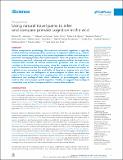Using natural travel paths to infer and compare primate cognition in the wild
Abstract
Within comparative psychology, the evolution of animal cognition is typically studied either by comparing indirect measures of cognitive abilities (e.g., relative brain size) across many species or by conducting batteries of decision-making experiments among (typically) a few captive species. Here, we propose a third, complementary approach: inferring and comparing cognitive abilities through observational field records of natural information gradients and the associated variation in decision-making outcomes, using the ranging behavior of wild animals. To demonstrate the feasibility of our proposal, we present the results of a global survey assessing the availability of long-term ranging data sets from wild primates and the willingness of primatologists to share such data. We explore three ways in which such ranging data, with or without the associated behavioral and ecological data often collected by primatologists, might be used to infer and compare spatial cognition. Finally, we suggest how ecological complexity may be best incorporated into comparative analyses.
Citation
Janmaat , K R L , de Guinea , M , Collet , J , Byrne , R W , Robira , B , van Loon , E , Jang , H , Biro , D , Ramos-Fernández , G , Ross , C , Presotto , A , Allritz , M , Alavi , S & Van Belle , S 2021 , ' Using natural travel paths to infer and compare primate cognition in the wild ' , iScience , vol. 24 , no. 4 , 102343 . https://doi.org/10.1016/j.isci.2021.102343
Publication
iScience
Status
Peer reviewed
ISSN
2589-0042Type
Journal article
Collections
Items in the St Andrews Research Repository are protected by copyright, with all rights reserved, unless otherwise indicated.

